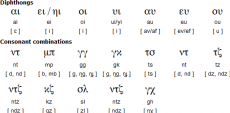
In the last lesson, we learnt the Greek alphabet, what their closest English letter was, and how to pronounce them. As well as this, the Greek language also has combinations of letters, called “Diphthongs” which make a different sound. If you see this combination of letters in a word, you’ll know to pronounce them together, rather than as two separate letters. So, here they are.
αι = This makes the ‘e’ sound, kind of like when you say “eh?” to ask when you didn’t hear something quite right.
ει = Another ‘e’ sound, like the double ‘E’ in “bee”.
οι = Also similar to that double ‘E’ sound.
αυ = Now we’re moving on to something a little different. This makes the sound ‘Av’ or ‘Af’, depending on the word, but people will understand you if you use either.
ευ = Similar to the above, except this one makes the ‘Ev’ or ‘Ef’ sound, as in the Greek “efharisto” (ευχαριστώ), meaning thank you.
ου = This makes a double ‘O’ sound, like the last letter in the word “who”. An example of this one is the phrase “πού;” which means “where?” This is one of the most common diphthongs.
μπ = This makes something like the sound of the letter ‘B’ in English.
γγ = This is like the letter ‘G’, like in the word “glory”.
γκ = Another ‘G’ sound.
τσ = This makes a ‘ts’ sound, like in “fingerprints”.
τζ = This makes a ‘dz’ noise, a harder sound than the one above.
ντ = The closest thing in Greek to saying the letter ‘D’, because the letter ‘δ’ in Greek is soft and sounds a bit like ‘th’, but this diphthong sounds like a proper ‘D’. However, in some words, it may be pronounced as two separate letters.
So now, you’ve got the basics of the alphabet. Yay, that’s a massive step out of the way, and for many it’s the largest obstacle – so well done on getting this far! It’ll really impress your friends or your family if you’re ever in Greece and are able to read out the names on the road signs without needing the English translation. In order to better help your pronunciation, we need to have a look at what the accents are for in Modern Greek.
In its simplest terms, the accents show the reader where to put the emphasis (or stress) on a word. The accent impacts the endings of the words in different tenses, but there’s no need to think about that yet. For now, let’s look at an example, which will help you see what I mean. The word “ευχαριστώ” (as used earlier – thank you) has the accent placed on the last letter, which is an ‘O’. Therefore, when we read this word aloud, we will say the letter ‘ω’ with more power and volume, if it helps to think about it that way.
These are the basics of accents and diphthongs, and are all you need for now to get a great basis in the language. Next time, we’ll be looking at some basic words and phrases that you’ll need to get by in Greece – so you can get talking to the locals!
Image from: http://www.tukkk.com/h-greek.htm

0 Comment:
Be the first one to comment on this article.